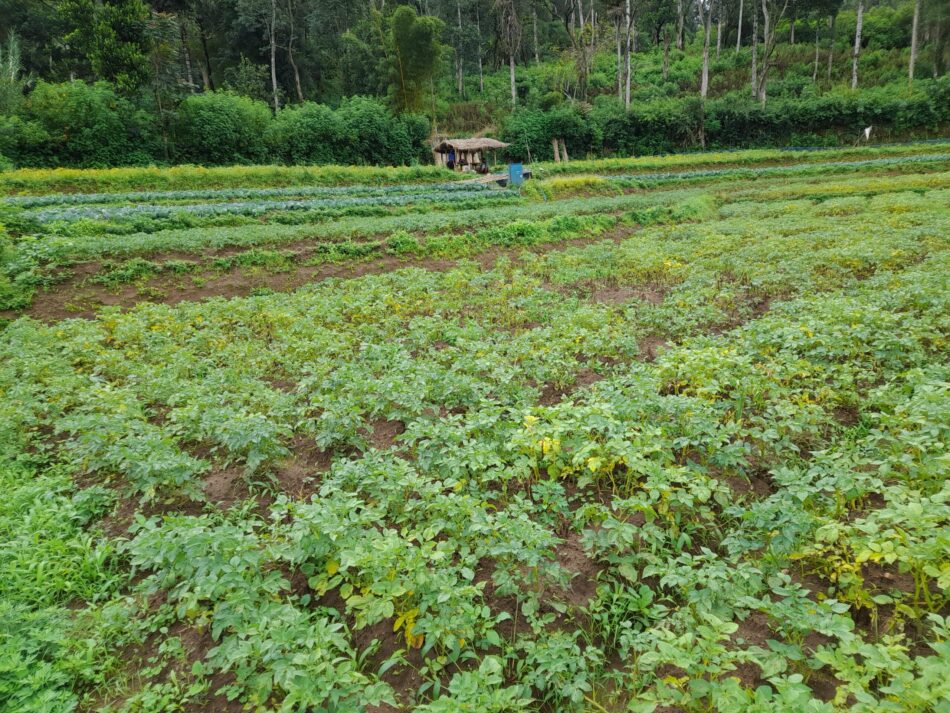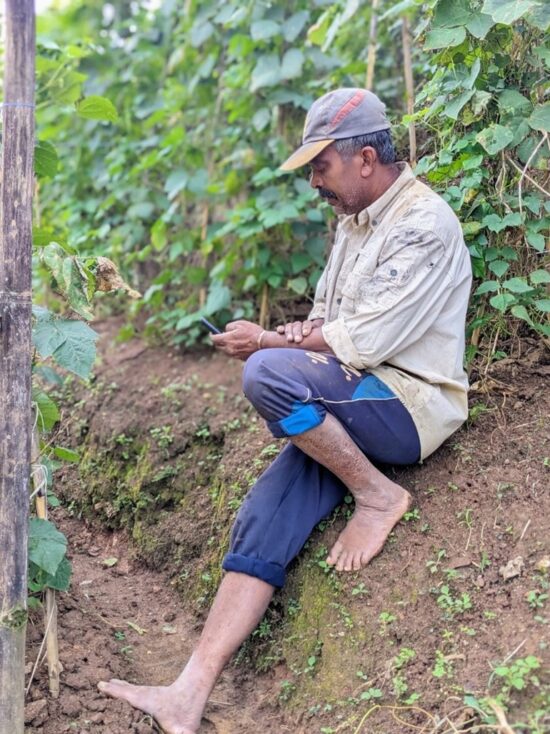Growing the use of real-time digital tools for smarter vegetable farming
Posted on March 20th, 2024
By Mohamed Aheeyar, Giriraj Amarnath and Niranga Alahacoon Courtesy IWMI
The FRESH Initiative, in collaboration with the ClimBeR initiative, is providing Sri Lankan farmers with climate information and agronomic advisories straight to their mobile phones.
In recent years, Sri Lanka has experienced the impacts of climate change with recurrent extreme droughts and intense rainfall events. Vegetable farmers in the upcountry areas traditionally rely on predictable seasonal rainfall patterns. However, climate change has disrupted these patterns, leading to erratic precipitation and an increasing number of extreme weather events like droughts and heavy rainfall. These climatic variations pose a significant challenge to vegetable cultivation, making crops susceptible to pests and diseases, potentially reducing productivity, and jeopardizing the quality of the harvests.

Integrated crop management: An un-beet-able approach
The CGIAR Initiative on Fruit and Vegetables for Sustainable Healthy Diets (FRESH) is implementing activities in four countries including Sri Lanka, to increase fruit and vegetable intake and improve diet quality, nutrition, and health outcomes. One of the research focuses is on safe and sustainable vegetable production for year-round availability by adopting options for sustainable diversification and intensification. FRESH is promoting the integrated management of vegetable production systems, including good agricultural practices that prioritize resource use efficiency, leading to greater productivity while offering safe food, environmental protection, and improved farmer well-being. The Initiative also addresses key constraints such as the lack of awareness and knowledge gaps in regenerative agricultural practices and climate change-related issues.
Despite the commendable efforts of Sri Lanka’s extension service in building farmer awareness and capacity, a critical gap remains in delivering essential services at the individual level. The limited number of field-level extension officers, each responsible for over 3,000 geographically dispersed farmers, creates a significant hurdle. This lack of personnel and expertise hinders the economic and environmental sustainability of Sri Lanka’s high-potential vegetable production system.
An urgent need is the substantial expansion of the extension workforce. Farmers require comprehensive training on integrated pest, disease and nutrient management practices. Tailored technological knowledge, specific to crops and local conditions, is also crucial for adopting integrated management approaches. This requires external support and collaboration to develop customized solutions for diverse farming contexts. By investing in a more robust and localized extension system, Sri Lanka can unlock the full potential of its vegetable sector, ensuring both economic prosperity and environmental sustainability.

Farming for the future
Using CultivateX,” a mobile platform developed by the International Water Management Institute, FRESH, in collaboration with the CGIAR Initiative on Climate Resilience (ClimBeR), is providing real-time climate information and agronomic advisories to farmers through existing mobile platforms. This is enabled by good digital infrastructure, including mobile phone penetration, usage, internet coverage and the high level of farmers’ literacy. Information sharing through digital platforms is expected to help minimize existing information asymmetries and extension gaps. On a pilot scale, 75 farmers received context-specific local weather alerts twice a week (at intervals of 3-4 days) and weekly agronomic advisories throughout the cultivation season. The provision of weather and agronomic advisories was designed to build the farmers’ climate resilience and capacity to understand climate variation and enhance knowledge of recommended agronomic practices.
Evaluation of the pilot farmers who read the delivered climate advisories indicates that the advisories were accurate for 74 % of the farmers and fairly accurate for all others. The agronomic advisories were very useful for 65% of the farmers. Farmers found the advisories on the effective use of fertilizers and agrochemicals, efficient planning of crop management activities, efficient scheduling of irrigation as per the climate forecast, and water and energy conservation to be the most useful. The agronomic advisories have helped the farmers to select the right pesticides, conduct the best crop management activities, reduce crop damage and minimize the use of agrochemicals.
Farmer reflections on the impact of advisories
- Samaraweera, Kulatunge and Jinasena are three tomato farmers aged 48-55 in Balangoda area. During the 2023 dry season, Kulatunge and Jinasena received climate advisories through a family member’s phone and from his friend, respectively. All three farmers mentioned that the climate advisories provided were accurate and guided them to decide the appropriate days for fertilizer and agrochemical application (rain-free days to avoid washaway) to make use of limited resources efficiently.
- Ratnasiri is a 74-year-old experienced farmer cultivating 0.25 acres of land in the same area said the weather forecasts he received helped him to plan 3-4 days ahead, including the hiring of labor and off-farm work. This has helped to save LKR 6,000-8,000.
- Silva confirmed that climate and agronomic advisories helped her to save money by applying the right inputs at the right time and deciding the right labor requirement, saving LKR 4000.
- A 41-year-old farmer said that the agronomic advisories helped him to identify many pests and diseases correctly and that he shared the messages received to his phone with many of his friends.